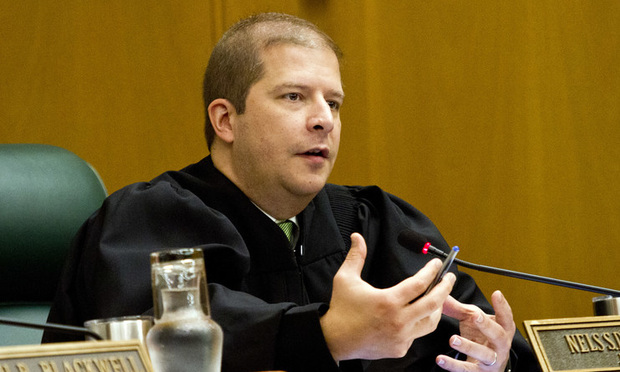Justice Foretells Future Debate on Cruel and Unusual Punishment
“I am skeptical that our analytical approach to the Cruel and Unusual Punishment Clause of the Georgia Constitution is consistent with the original public meaning of that Clause,” Justice Nels Peterson said.
March 06, 2019 at 02:41 PM
6 minute read
 Justice Nels Peterson, Supreme Court of Georgia. (Photo: John Disney/ALM)
Justice Nels Peterson, Supreme Court of Georgia. (Photo: John Disney/ALM)
If the Georgia Supreme Court had a crystal ball, it might show a debate coming up about what constitutes cruel and unusual punishment.
That prediction comes from a concurring opinion Justice Nels Peterson wrote and shared Monday expressing concern that the high court could be off track on the subject. It also offers a textbook definition of originalism.
“I am skeptical that our analytical approach to the Cruel and Unusual Punishment Clause of the Georgia Constitution is consistent with the original public meaning of that Clause,” Peterson began—getting straight to his point as he can be counted on to do.
Peterson agreed fully with the majority opinion by Justice Keith Blackwell. Blackwell explained the high court's decision to reinstate a 20-year prison sentence that a judge for a habeas corpus challenge threw out on the determination that it was “cruel and unusual.” Blackwell said the habeas court was wrong on the facts and the law.
The case at hand is that of Brandon Pate. Prosecutors and two witnesses told the jury about a night in late December 2006 or early January 2007—when Pate was 15 years old—at the home of a girl identified as M.R., who was 13, according to Blackwell.
M.R. had let her best friend sneak into her bedroom window to watch television and eat snacks, even though her father—asleep in the next room—had forbidden her to have visitors that night. Pate and another boy had dropped off the best friend. Pate returned through the window later, ostensibly to pick up the friend. But then he demanded sex from M.R. When she refused, he pulled a knife from his pocket and threatened to “slit your dad's throat.” Believing him, she complied. She said nothing for two years. When she finally told her father, he reported the incident to police, according to Blackwell.
Pate was convicted in 2010 of statutory rape, aggravated assault and possession of a knife during the commission of a felony, Blackwell said. He was sentenced to 20 years in prison for the statutory rape, plus probation for another 20 years for aggravated assault and an additional five years of probation for possession of a knife. The jury acquitted him of the most serious charge, forcible rape.
In 2018, a Washington County judge set aside the convictions on the grounds that both Pate and M.R. were juveniles and so the case should not have been a felony, and that the sentence was “cruel and unusual,” Blackwell said.
“We first consider the determination of the habeas court that the statutory rape of which Pate was found guilty is only a misdemeanor,” Blackwell said. “The habeas court reasoned that Pate was 'not more than two years older' than M.R. at the time of the statutory rape, and for that reason, his conduct was punishable only as a misdemeanor under OCGA § 16-6-3 (c).”
That law says that a case is a misdemeanor if a victim is at least age 14 but under 16 and the person convicted of statutory rape is 18 or younger.
“Here, M.R. was only 13 years of age at the time of the statutory rape,” Blackwell said.
Next, the court turned to the finding that the sentence was cruel and unusual.
“In this case, the habeas court's inference of gross disproportionality
Rested principally on its view that the conduct underlying Pate's conviction for statutory rape was merely 'consensual sex with an individual younger than him' and was only a 'passive felony.' But the record shows that this characterization is wrong.” Blackwell said. “M.R. did not readily consent to sex with Pate at all—she refused him repeatedly and expressly. She finally gave in and agreed to have sex with Pate only after he brandished a knife and threatened to kill her father, who was asleep in an adjoining bedroom. To call such conduct 'consensual sex' and only a 'passive felony' is to grossly mischaracterize what Pate did to M.R.”
Blackwell went on to say that Pate's 20 years in prison “does not meet even the threshold inference of gross disproportionality, and so, despite his young age, his sentence for statutory rape must stand.”
Attorney General Chris Carr had no comment on Blackwell's decision or Peterson's concurrence.
Pate was represented by Ecleynne Mercy and Timothy McCalep.
“I am extremely disappointed with the Supreme Court's ruling,” McCalep said. “I am however, optimistic that the Court's opinion will benefit other defendants seeking justice and relief.”
Peterson's concerns about the “original public meaning” of cruel and unusual punishment in the Georgia Constitution could come up again.
Peterson cited Elliott v. State, 2019 Ga. LEXIS 112, at *17 (II) (C) (Case No. S18A1204, decided Feb. 18, 2019). The Elliott opinion said the justices “should not simply recite holdings” of the U.S. Supreme Court regarding the U.S. Constitution and “uncritically import them into our interpretation” of parallel provisions of the Georgia Constitution,” Peterson said.
“But for the last several decades, we have done precisely that in our application of Georgia's Cruel and Unusual Punishment Clause,” Peterson said. “Instead, we should interpret the Clause according to its original public meaning, informed by its text, context, and history.”
“Interpretation of this provision requires consideration of its meaning in 1861,” Peterson said.
“Shortly after the Georgia provision's adoption, we explained the meaning of the prohibition on cruel and unusual punishment,” Peterson said. That holding was that, as long as the General Assembly does not provide cruel and unusual punishments, “such as disgraced the civilization of former ages, and make one shudder with horror to read of them, as drawing, quartering, burning,” the Constitution does not limit legislative discretion.
“We expressly viewed this construction as incompatible with what would become the United States Supreme Court's 'evolving standards of decency' analysis,” Peterson said. “But then the United States Supreme Court's dramatic shift in interpretation of the Eighth Amendment during the 1970s—including the invalidation of Georgia's death penalty—knocked us off course. And by the late 1980s, we had reversed course entirely.”
Peterson cited Fleming v. Zant, 259 Ga. 687 (1989). He said in that opinion the court addressed the history and context of the Georgia Constitution in one sentence and then “flatly ignored” it in the next, turning away from 100 years of precedent.
“Ever since, we have applied the United States Supreme Court's 'evolving standards of decency' analysis to decide questions under the Georgia Constitution,” Peterson said. “It seems to me quite likely that such an approach cannot be squared with the original public meaning of the Georgia Constitution, and if it cannot, we should reconsider our approach in the proper case.”
The case is Conley v. Pate, No. S18A1121.
This content has been archived. It is available through our partners, LexisNexis® and Bloomberg Law.
To view this content, please continue to their sites.
Not a Lexis Subscriber?
Subscribe Now
Not a Bloomberg Law Subscriber?
Subscribe Now
NOT FOR REPRINT
© 2025 ALM Global, LLC, All Rights Reserved. Request academic re-use from www.copyright.com. All other uses, submit a request to [email protected]. For more information visit Asset & Logo Licensing.
You Might Like
View All

On The Move: Ex-Partner Returns to Lead Nelson Mullins Corporate Group, Burr & Forman Hires University GC as COO
5 minute read
Law Firm Sued for Telemarketing Calls to Customers on Do Not Call Registry

Evidence Explained: Prevailing Attorney Outlines Successful Defense in Inmate Death Case
Trending Stories
- 1We the People?
- 2New York-Based Skadden Team Joins White & Case Group in Mexico City for Citigroup Demerger
- 3No Two Wildfires Alike: Lawyers Take Different Legal Strategies in California
- 4Poop-Themed Dog Toy OK as Parody, but Still Tarnished Jack Daniel’s Brand, Court Says
- 5Meet the New President of NY's Association of Trial Court Jurists
Who Got The Work
J. Brugh Lower of Gibbons has entered an appearance for industrial equipment supplier Devco Corporation in a pending trademark infringement lawsuit. The suit, accusing the defendant of selling knock-off Graco products, was filed Dec. 18 in New Jersey District Court by Rivkin Radler on behalf of Graco Inc. and Graco Minnesota. The case, assigned to U.S. District Judge Zahid N. Quraishi, is 3:24-cv-11294, Graco Inc. et al v. Devco Corporation.
Who Got The Work
Rebecca Maller-Stein and Kent A. Yalowitz of Arnold & Porter Kaye Scholer have entered their appearances for Hanaco Venture Capital and its executives, Lior Prosor and David Frankel, in a pending securities lawsuit. The action, filed on Dec. 24 in New York Southern District Court by Zell, Aron & Co. on behalf of Goldeneye Advisors, accuses the defendants of negligently and fraudulently managing the plaintiff's $1 million investment. The case, assigned to U.S. District Judge Vernon S. Broderick, is 1:24-cv-09918, Goldeneye Advisors, LLC v. Hanaco Venture Capital, Ltd. et al.
Who Got The Work
Attorneys from A&O Shearman has stepped in as defense counsel for Toronto-Dominion Bank and other defendants in a pending securities class action. The suit, filed Dec. 11 in New York Southern District Court by Bleichmar Fonti & Auld, accuses the defendants of concealing the bank's 'pervasive' deficiencies in regards to its compliance with the Bank Secrecy Act and the quality of its anti-money laundering controls. The case, assigned to U.S. District Judge Arun Subramanian, is 1:24-cv-09445, Gonzalez v. The Toronto-Dominion Bank et al.
Who Got The Work
Crown Castle International, a Pennsylvania company providing shared communications infrastructure, has turned to Luke D. Wolf of Gordon Rees Scully Mansukhani to fend off a pending breach-of-contract lawsuit. The court action, filed Nov. 25 in Michigan Eastern District Court by Hooper Hathaway PC on behalf of The Town Residences LLC, accuses Crown Castle of failing to transfer approximately $30,000 in utility payments from T-Mobile in breach of a roof-top lease and assignment agreement. The case, assigned to U.S. District Judge Susan K. Declercq, is 2:24-cv-13131, The Town Residences LLC v. T-Mobile US, Inc. et al.
Who Got The Work
Wilfred P. Coronato and Daniel M. Schwartz of McCarter & English have stepped in as defense counsel to Electrolux Home Products Inc. in a pending product liability lawsuit. The court action, filed Nov. 26 in New York Eastern District Court by Poulos Lopiccolo PC and Nagel Rice LLP on behalf of David Stern, alleges that the defendant's refrigerators’ drawers and shelving repeatedly break and fall apart within months after purchase. The case, assigned to U.S. District Judge Joan M. Azrack, is 2:24-cv-08204, Stern v. Electrolux Home Products, Inc.
Featured Firms
Law Offices of Gary Martin Hays & Associates, P.C.
(470) 294-1674
Law Offices of Mark E. Salomone
(857) 444-6468
Smith & Hassler
(713) 739-1250






